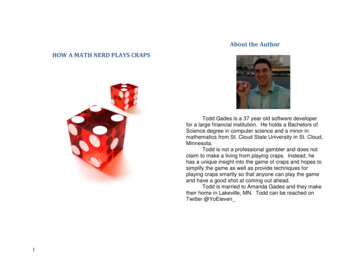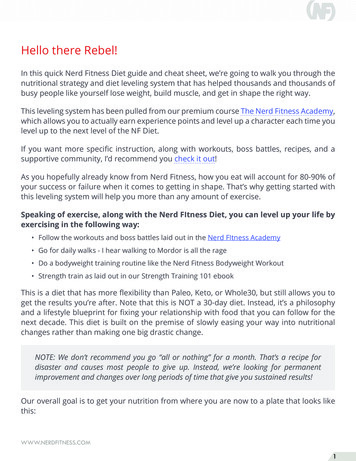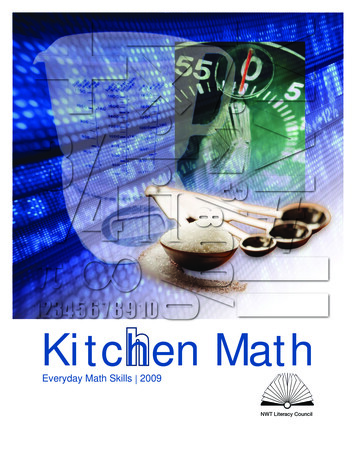
Transcription
About the AuthorHOW A MATH NERD PLAYS CRAPSTodd Gades is a 37 year old software developerfor a large financial institution. He holds a Bachelors ofScience degree in computer science and a minor inmathematics from St. Cloud State University in St. Cloud,Minnesota.Todd is not a professional gambler and does notclaim to make a living from playing craps. Instead, hehas a unique insight into the game of craps and hopes tosimplify the game as well as provide techniques forplaying craps smartly so that anyone can play the gameand have a good shot at coming out ahead.Todd is married to Amanda Gades and they maketheir home in Lakeville, MN. Todd can be reached onTwitter @YoEleven1
Table of ContentsChapter 1 : Introduction . 3Chapter 2 : Why Craps? . 5Chapter 3 : The Game . 8Chapter 4 : Craps Lingo . 12Craps Table Layout . 14Chapter 5 : The Bets . 15Chapter 6 : Roll Distributions and Probability . 20Chapter 7 : House Edge . 22Chapter 8 : The Best Bets . 23Chapter 9 : Bankroll . 24Chapter 10 : The “Luck” Factor. 28Chapter 11 : A Simple 6/8 Strategy . 29Chapter 12 : An Expansion of the Simple 6/8 . 32Chapter 13 : Betting “Units” . 35Chapter 14 : Betting the Passline . 37Chapter 15 : Passline Come . 39Chapter 16 : More On Place Bets . 41Chapter 17 : Buying the 4 and 10 . 43Chapter 18 : A Combination Strategy . 44Chapter 19 : Expanding on the Combination Strategy . 46Chapter 20 : Guarantee a Profit . 48Chapter 21 : Other Systems . 51Chapter 22 : Martingale Betting . 55Chapter 23 : Fibonacci betting . 57Chapter 24 : “Pressing” Strategies . 59Chapter 25 : True Stories . 62Chapter 26 : Etiquette . 69Chapter 27 : Electronic Games . 722Chapter 28 : Build Your Own System . 74
How a Math Nerd Plays CrapsChapter 1 : IntroductionThe game of craps, I believe, is easily the mostfun game in the casino. And aside from counting cardsor cheating at a game, it offers the best chance toactually win money. The “poker boom” of recent yearshas brought a lot of attention to casino gambling. Moreand more states are allowing casinos as a source ofrevenue, and more and more people are gambling inhopes of being like the people they see on TV winningmoney. Let’s face it though, not everyone can be a pokerprofessional. Very few can, actually - ditto for being anexpert card counter at blackjack. Not to mention thechance of being caught and banned from casinosforever!Craps, however, takes very little skill to play well very well, in fact. Played well, I believe it is the easiestgame to consistently have the best shot at makingmoney. You can play with almost no house edge attimes, meaning you only need to get slightly lucky to besuccessful. Just one or two random rolls of the dice outof 100 in your favor can turn the tides and give YOU theadvantage over the casino. Even if the dice are slightlyout of your favor, you can still profit from craps. Thereare no “basic strategy” systems to memorize with large3and complex tables that end up being not-so-“basic”, andno shrewd ways of playing which require advancedintelligence. This can be a beatable game in the shorthaul, which is what most of us play, and I hope to tell youthe best ways of how to do it.I’m a self-professed math nerd and proud of it.True, it doesn’t make a lot of women swoon, but it doeshelp a lot in terms of earning money, keeping money, andmaking money grow (no, not on trees at least not yet). Ihave a degree in mathematics and have always enjoyedapplying it in real life. Applying mathematics at a crapstable in order to make money while gambling seemsmore interesting to me than calculating the strength of abridge or ideal insurance rates, how about you?In my college days pursuing a computer sciencedegree, I spent a lot of late nights in the computer labworking on programming projects. One night my labpartner and I got bored and decided to download whatwas a new phenomenon back then - an online casino!We fired up the craps table and were completely lost asto just what the #@%& was going on. Sometimes betswon, sometimes they lost. Sometimes the same numberrolled on the dice would win for a bet and sometimes itwould lose for that same bet! “WTF is going on here?”we thought. It must be a software error! So we decidedto figure out what the program's glitch was, looked up therules to the game and found out the program wasworking correctly, we just didn’t understand the game!It turned out I had found the game which intriguesme to no end. The math involved here, the probabilities,
the house edge, betting strategies, money managementstrategies, betting progression theories there’s someserious depth and potential here. And it isn’t difficult toplay this game well!So what is this book about? I’ve taught many ofmy friends the game of craps. Some play it with me,some don’t. Some win money, some don’t. But, suffice itto say, we have fun, and I’m addicted to it. I’ve beensuccessful playing craps. I’m not going to BS you; I don’tplay thousands of dollars for hours upon hours, winningtens of thousands of more dollars. I go with my wife andfriends to Las Vegas and we want to hit the pool, wewant to hit the buffet, we want to do some peoplewatching. We're truly "low-rollers". For the most part, I’dsay I’ve recouped about a third of all my Vegas expensesplaying craps. Are there mega jackpots? No. Go wastetime and money at the slots if you want a shot at that. DoI earn tons of “comps” points such that casinos areasking me to come play and giving me tons of freebiesto keep me happy? No. A math nerd plays to win somemoney for dinners, get some free drinks while playing,maybe help pay for the airfare, and some extra“entertainment” bucks.This book isn’t about math. I won’t bore you with abunch of formulas and advanced concepts. They mightjust bore and confuse you even more and turn you off tothe game. Instead I’ll try to explain the math in morereal-world terms. If you can count chips and do somesimple adding and subtracting, you will easily be able tohandle the math involved in the game of craps. The4math cannot be avoided at times, but I’ll try my best tokeep it simple.
Chapter 2 : Why Craps?Why does a math nerd choose craps to play?Why does a math nerd gamble in a casino at all? Theseare both great questions. All casino games are set up forthe player to lose. Yes, all. Including craps! Anextreme math nerd would avoid a casino altogether andbuy 10-year treasury notes or something similarly FDICinsured. *Yawn* I can’t chastise him that much, becausethose products will make you money, but seriously?Booorriiing .!!I’m interested in taking a risk of losing some of myhard-earned money, though, and likely you are too ifyou’re reading this book.Blackjack is one game that a player can get anadvantage over the house if he or she is an expert playerwho has memorized “basic strategy” and is a perfect cardcounter. Card counting is an entire book in and of itself,but it takes months and years of practice to learn andplay it perfectly. Then you actually have to get away withit in a casino, and casinos are becoming more and moreadept at catching card counters! Teams of countershave been able to further exploit this advantage and evenincrease it. But again, very few people are able toperform this expert skill. Even fewer could be part of asuccessful counting team.A solo card counter may be able to get away withit if he or she is good. But a card counter must play a5very long time in order to eek out a small 2% or soadvantage. The casinos normally have this advantage,and they are open 24 hours a day and always playing,which is why they are the winners in the long run. On topof that, casinos are now changing the rules of blackjackto dissuade counters. They will pay less than thetraditional 3 to 2 for blackjacks and/or increase thenumber of decks in play - both of which are notadvantageous for the player.Another problem I have with blackjack is theshuffle. Assuming a player has “basic strategy”memorized and plays it strictly and every player at thetable plays it strictly, the player’s destiny is essentiallydetermined once the shuffle and cut is complete. Thosecards are not coming out randomly; they are in a setorder. The shuffle itself may mix up the cards very well,but it is not random by any stretch of the definition. Thatsmall 2% advantage comes into play assuming a playergoes against many shuffles, whereby you are likely tosee a fair distribution of cards such that it “appears”random.I’ve been at a blackjack table where I playedperfect basic strategy and yet lost 7 hands in a row.Why? The shuffle simply was not in my favor. Had Igone outside the basic strategy and done somethingincorrectly, I could have potentially altered the outcomeof my hands to shift them in my favor. (Maybe I shouldhave!) But you are essentially a robot if you are playingbasic strategy blackjack. There’s no creativity in playing
like a robot. Craps, on the other hand, is full of creativity!(More on that soon )The opposite can also be true; the shuffle may beso much in your favor that it doesn’t matter much howyou play, those cards are just coming out winners for youover and over. This is where a counter really does hisdamage. Personally though, it really bugs me when I’mplaying how the math and strategy dictates I should play,but I keep losing because the deck’s order was againstme the entire time.What about slots? A math nerd would say thatslots are simply a waste of time. They require no skilland are boring. They are not random either, despiteclever computer algorithms that make it look like thenumbers are random. The machines are programmed topay out a certain amount and keep a certain amount. Inmany states, this is actually a legal requirement, not acasino’s choice. Over the long run every machine willhave to pay out a big jackpot or it will be breaking thegaming laws. You may, I emphasize may, be able totrack how long certain machines have gone beforethey’ve paid a jackpot to help determine when it may be agood time to hop on, but let’s face it, you’ve got betterthings to do. If you must play slot machines, play lowdenominations and make sure you get a free drink or twowhile you play.How about Video Poker? This can be a lucrativegame for a math nerd. But again, there is a differentbasic strategy for every type of poker game which needsto be memorized and practiced. On top of playing6hundreds or possibly thousands of scenarios perfectly,you must get a machine with a favorable pay table inorder to get your 98% or 99% expected payout, and thenhope you get some favorable hands dealt to you. Andyou have to find a machine that no one else is using!There are a lot of people in the casino who know whichmachines have the good pay tables, and those machinesare the ones people flock to.Live poker is a game that can be beaten, butagain, this takes years of practice in reading people,knowing how to tell tells (pun intended), and takeadvantage of weaker players, all while knowing whenyou, yourself, are beat and when to get out of a hand.Very few people are successful in this business.Roulette is a fun game, but the house edges onthe bets are very high. If you can find a wheel with onlyone single-green-zero slot, you’ve got better chances ofcoming out ahead, but realistically the bets in this gamehave a house edge that are too high for a math nerd totake seriously.Craps however is a game of virtually truerandomness with the dice throws, excellent bets withhouse edges as low as 1% or lower, and a helluvalottafun to play! Many people shy away from it because itlooks very complex. My hope in this book is to breakdown the complexity of craps into smaller parts that aresimple to understand. Some people are embarrassed tostep up to a craps table because they don’t know how toplay. Or worse – they get up to a table thinking they area hot shot only to lose their shorts because they don’t
know how to play. I’m here to show you the good bets,the not-so-good-bets, explain the game, and tell you thebest ways of how to win. Craps is a good mix of skill andluck. The luck, of course, is in the dice throws. The skillis in making good bets, knowing when to bet more,knowing when to bet less, and in managing your moneywisely.Winning at gambling always feels good, no matterwhat game you are playing. But unlike losing atblackjack or video poker, when I lose at craps it is more afeeling of, “Oh well, the dice just weren’t rolling my waythis time!” than a feeling of “It didn’t matter what I didbecause the cards just kept coming out against me,there’s nothing I could do about it!" or "This stupidmachine! ” In craps, all that needed to have happenedwas for that one die to have flipped a hair more to oneside and avoided a bad number for you. In blackjack,guess what? If you sat down when the deck was in abad shuffle for you, you’re screwed and that’s final.This is why I love craps. Anyone can easily makethe best bets in the house and get extremely low houseedges. Craps is a very social game and you can playwith friends or even make new friends at a table. All ofthis and it doesn’t require memorizing any complicatedperfect systems, doesn’t require advanced intelligence,and doesn’t require hours and days and months andyears of practice. So here it is how I, a math nerd,plays craps 7
Chapter 3 : The GameIf you already know the rules of the game, I’ll behonest, skip this chapter. The one-liners containedherein aren’t that good. Go directly to chapter 6. Do notpass GO. Do not collect 200. (Well, hopefully you willon the felt).Okay for those of you still left and not yet boredout of your mind, first thing you do - hop on the internetand download a craps game. There are many out there,either online casinos (which don’t require you to play withreal money) or a standalone software program. “Practicemakes perfect” is what my mother always said, and Ibelieve it to be true here as well. Once I get into talkingabout my strategies, you’ll find being able to practicethem on a computer simulation game is an invaluableasset.But let me talk about the live game. First, there’sone guy in a casino uniform holding a big stick. No, hedoes not whip you with it, even if you ask him to. Heuses it to gather up the dice as the shooter throws ‘em.On each end of the table stands a dealer in an equallybad and matching uniform. He’s the one taking yourchips when you lose and giving you more when you win.In between the dealers is the boxman, usually wearing anormal business suit, thank goodness. He’s there tomonitor everything, track comps, rule on any iffy-bets thatsome drunk slob threw out onto the table just as the dice8were being thrown, and generally harass you about yourfunny looking Minnesota driver’s license after he cardsyou (It happened to me, seriously!). Around the rest ofthe table stand the players. Which brings me to anotherpoint - why the #@%& don’t they bring chairs? But Idigress Here’s how the game works. I’m not going todiscuss the bets right now. Instead, you first need tounderstand the flow of the game before you startthrowing chips on the felt. If you don’t understand howthe game works, then you’ll lose chips like we did withthe online casino back in the college computer lab, Ipromise.Let’s say a brand new table opens up with a groupof frat boys on spring break. The guys start throwingchips around and the dice are handed to one of them bythe stickman. Don’t worry about how the frat boys arebetting just yet, we’ll get to that. For now, I just want toexplain the flow of the game.The person rolling the dice is called the “shooter”,and he rolls the dice to the opposite end of the table tostart a game. Think of a “game” as a series of rolls, asshort as 1, as long as infinity, during which the shootereither wins or loses.I know what you are thinking: “Whoa math nerd!Infinity? Stop talking theoretical BS here, WTF does thatmean?”A “pass” means the shooter has won a game. A“miss” means they’ve lost the game.
“Ok ok so how do you win?”You know in the movies or on TV, people jump upand down whenever someone rolls a 7? Or the Elvisline, "Let me shoot a 7 on every shot"? If it’s the first rollof a new game and you toss a 7, bingo! That’s animmediate pass (win). Same if it’s an 11.“Oh yeah, 7 come 11, I’ve heard that before!”The flip side though and you’ll seeEVERYTHING in craps has a flip side is craps. 2, 3,and 12 are called the “craps” numbers. If the first roll of anew game is craps, it’s an immediate miss (loss).These rules for 2, 3, 7, 11, and 12 only apply tothe first roll of the game, called the comeout roll. Ithas nothing to do with a closet, it’s just the first roll of thegame. It’s an important term, though, so remember it!Read this paragraph again. Repeat it until you firmlyhave a solid understanding of the comeout roll. (Hint: it’sin the boldface text!)Now that you know the first roll of the game is thecomeout roll, maybe you’re wondering, “How can you tellif the next roll is a comeout roll?”There are 3 ways to know if the next roll is acomeout roll. First, the stickman will say it’s the comeoutroll just before the shooter throws the dice. Second, theblack pucks in front of the dealers will say OFF. Look onyour internet craps game or software program, you willsee a round black marker about the size of a hockeypuck that either is black and says OFF or is white and9says ON. Third, if a new person becomes the shooter,his or her first roll is always a comeout roll. Again, thestickman will say something like, “new shooter comingout!”Okay, so we covered 2, 3, 7, 11, and 12 for thecomeout roll, what about the other numbers? This is themeat of the game. 4, 5, 6, 8, 9, and 10 are the otherpossible numbers you can roll. If this happens, thatnumber becomes the “point”. The shooter’s goal is tothen roll that same number again which is called the“point” before he or she rolls a 7. Again, read thisparagraph one more time. It’s important you understandwhat the points are, and how the shooter tries to roll theirpoint a second time. Let’s go through a quick example Let’s say the comeout roll is a 7. It’s a pass!“Way to gooooo, shootah!” High fives all around! A newgame starts right away, because the previous one justended with a pass/win (remember I said a game could beas few as 1 roll?).Next comeout roll is a 2. Craps! A loser! Well easy come, easy go, right?Let’s give this a 3rd try . New comeout roll is 5.Okay, that’s a point number. The point is a 5. Thedealer will now take the black puck which says OFF, flip itover to the white side that says ON and move the pucknext to the number 5.“So what’s this point thing mean again, mathnerd?”
The shooter will now roll over and over and overuntil they either roll the 5 again, in which case, the gameis another win, people jump up and down and scream(oh. so this is why there are no chairs!), or they roll a 7and the frat boys start swearing and bragging about howmuch better THEY could have done. If he does roll a 7,that’s called sevening out, and it means the game islost. The dealer will flip the puck back to the OFF sideand move it to the end of the table. The dice will thenmove to the next player on the left, and the wholeshootin’ match starts over with a new comeout roll.So what does this mean for betting? Right nowI’m just explaining the flow - how a game starts, how itends and how the dice move around the table. Butgenerally, you can make a bet that the shooter will wintheir game, OR you can even bet that the shooter willlose their game. If you are correct in how you bet thegame will end, you’ll win. If you’re not, you’ll lose.Here’s another example which will help younewbies :10 Player 1 is the shooter: come out roll is a 6point is 6) Player 1 throws again: trying to roll another 6 nope, it’s a 5. Player 1 throws again: trying to roll a 6 nope it’sa 9.(The Player 1 throws again: it’s an 11 (notice this isNOT a win because it’s not the comeout roll) Player 1 throws again: it’s a 6! Winnah winnah 6!The game is a pass or win! New game, player 1 keeps the dice and throws onthe comeout roll: it’s a 3. Craps a loser! (But hekeeps the dice because he did not seven out) Player 1 throws another comeout roll: it’s a 10(The point is now 10) Player 1 throws: trying to roll another 10, butinstead it’s a 7! Seven out! The game is a miss orloss, and the dice are given to the next player New shooter player 2: come out roll is 7!Automatic win on the 7 since it was a comeout roll!Cue shouting and high fives! Player 2 a new come out roll is a 4. (The point is4) Player 2 shooting for the 4: It’s an 8. Nothingexciting happens here. Player 2 throws again and this time it’s a 4!Winnah winnah 4! Player 2 made their point! Cuehigh fives once again!
Got it? That’s the flow of the game. Notice howthe same shooter keeps the dice until he or she sevensout. That is when the table is wiped clean of all losingbets, winners are paid and a new shooter starts. Try afew games on your internet game or software programand you should be able to follow it after a short time. Youcan now step up to a table and know just what the heckis going on. But uh you have no idea how to bet yet!11
Chapter 4 : Craps LingoNickel : 5 chipHere’s a list of terms I’ve heard and know aboutwhich you may also hear. I will use a lot of thesethroughout the book so hopefully these will help you out.Quarter : 25 chip (You may ask a dealer when buyingin to give you “nickels”, or “quarters”, or both)Shooter : The player who is throwing the dice.Line / Front Line : Same as the Passline.Backline : Same as Don’t PasslineSeven out : When the player rolls a 7 instead of theirpoint number. The game is considered a “loss”.Line Away : What the stickman often says when ashooter sevens out.Pay the line : When the stickman often says when ashooter makes his or her point. The game is considereda “win”.Comin’ out : The next roll is a comeout roll.Craps : A roll of 2, 3, or 12.Bones : DiceChecks : Same as chips12Aces : A roll of 2. (Each die has a 1)Ace-Deuce : A roll of 3.No-field 5: A roll of 5. (The field loses when a 5 is rolled)Forty-five: A roll of 9 where the dice show a 4 and 5.Sometimes also called a “Colt”, as in the handgun, “Colt45”.Puppy Paws : A roll of 10 where the dice show two 5’s. Ifyou look, they resemble puppy paws.Yo / Yo 11 : A roll of 11. Eleven sounds very similar toSeven, so to avoid confusion, people will say Yo instead.Boxcars : A roll of 12.Hard : a roll of doubles, i.e. 2,2 or 3,3, etc.Easy : a non-doubles roll, i.e. 2,6, or 4,6, etc.3x, 4x, 5x odds : The maximum bet allowed in odds is 3times your bet for the 4 and 10, 4-times your bet for the 5
and 9, and 5-times your bet for the 6 and 8. Some tableswill have different variations but 3x, 4x, 5x is common.Color me up : Asking the dealer to count your remainingchips and give you the correct change in fewer chips. (i.e13one 100 chip instead of twenty 5 chips. it's easier tocarry)
Craps Table Layout14
Chapter 5 : The BetsLook at a picture of a craps table. Pretty wild,huh? Or as a Canadian would say, “Pretty wild, eh?”Better yet, look at one with chips on it. Even crazier! Buthey, I’m here to help.Passline – This is the “outer ring” closest to where youstand, and where you typically see chips directly in frontof a player. What does it mean? It means you’re bettingthat the shooter is going to pass, or win this next game.It pays “even money” which means you’ll win the sameamount as your bet if you win. Remember the 7 or 11 onthe comeout roll? That’s the passline. Remembermaking the point? That’s the passline. Remembersevening out? That’s the passline. The passline is usedin many of my strategies, so you should take some timeto understand it. If you bet here and the shooter rolls a 7or 11 on the comeout roll you will win the same amountas your bet. If the shooter makes the point you will winyour bet. But if you bet here and the shooter loses thegame, either by throwing 2, 3, or 12 on the comeout roll,or by sevening out, your chips are swept away to thedealer’s stack. NOT what a math nerd likes to see! Butthe house edge here is only 1.4%, which means that overtime, for every 100 wagered on the passline, the casinois expected to take 1.40 in profits for themselves.That’s outstanding in terms of casino odds. You will15always want to make bets with the lowest house edgesbecause mathematically, these are considered betterthan bets with high house edges. Once you've bet on thepassline and a point has been established, you cannotremove that bet, it is locked in place until the game hasfinished.But wait, there's more! The passline unlocks thekey to the best bet in the house. The only bet in theentire casino which has 0.00% house edge. No, I'm notjoking. That's right. NO HOUSE EDGE! It'sappropriately named the odds bet. If you've made a beton the passline and a point is established, you can thenadd more money to the bet and get paid TRUE ODDS onthose extra chips if the point number is rolled again. Youmake this bet by putting more chips behind your passlinebet in the unmarked area of the felt. There are nomarkings on the felt for the odds bet. The casinoprobably doesn’t want you to bet here because they haveno edge. However, dealers will often ask you aboutadding odds to a passline bet. It’s their job to get moremoney on the table.Besides having no house edge, another greatthing about odds bets are you can also increase ordecrease your odds at any time or even taken themcompletely off the table. Here's an example describingbetting on the passline and also adding odds: (Warning,math ahead!)
5 Passline alone : always pays even money. Ifthe point is 4 or 10, there is a 2:1 disadvantage(meaning you should lose 2 times for every 1 timeyou win). If the point is 5 or 9, there is a 3:2disadvantage, and there is a 6:5 disadvantage ifthe point is 6 or 8. 5 Passline 10 odds : pays 5 true odds ifyou win :If they make the 4 or 10 as the point, you'll get paid 25.( 5 pass 2/1 x ( 10 odds)) So you risked 10 more,but won 20 more!If they make the 5 or 9, you'll get paid 20. ( 5 pass 3/2 x ( 10 odds)) So you risked 10 more, but won 15more!If they make the 6 or 8, you'll get paid 17. ( 5 pass 6/5 x ( 10 odds)) So you risked 10 more, but won 12more!Playing "double odds" in this example, 10, or twice yourpassline bet of 5, reduces the house edge down to ameasly 0.6%. That’s almost nothing! Passline odds isvery powerful.16Don’t Pass – Simply put, it’s the exact opposite of thepassline with one exception: the 12 will not win on thisbet, it will push (meaning it doesn’t win or lose). Notmany people bet on the don’t pass line. If they do, theyare said to be betting on the “dark side” and can be thetarget of a lot of negative chi. However, it also has a1.4% house edge, so for a math nerd it’s actually a reallygood bet. But like the red-headed stepchild, it justdoesn’t get much attention. This bet is really good on a“cold” table, where shooters are not making their pointsand are sevening out often. Like the passline, it payseven money for winning bets.Field – This bet looks really enticing. 2, 3, 4, 9, 10, 11,12! Look at all those numbers! And it pays even money!If the next roll is one of these numbers, you win.Otherwise, you lose. Ah but a math nerd would dosome counting here there are 16 ways you can makethese numbers, out of 36 total possible rolls. Uh 16/36is quite a bit short of even 50-50, which is what the betpays if you win. 16 ways to win and 20 to lose!?However, most casinos pay double for the 2 and 12,some will even pay triple for the 12. So that brings youup to as high as 19 wins for 20 losses which is better, butthat is still short of 50-50. This setup with the payoutdouble for the 2 and triple for the 12 has a house edge ofabout 2.75%. Not bad, but we can do better.
Come – This is exactly the same as the passline, exceptyou only bet here after a point has been established. Iknow what you’re thinking, “Huh?” The come bet oftenconfuses new craps players, but it's not that difficult tounderstand if you can see it in action on your onlinecraps game. Within the game where the shooterestablishes a point for the passline, you can haveseparate new mini-games for the come bet! Wild!!! Itpays the same amount as the passline - even money. Italso pays on the 7 or 11 if it’s not a comeout roll andloses on 2, 3, or 12. Otherwise the chip is moved up tothe new point number just rolled and you’ve got a new“come point” working outside of the passline point! Asyou might expect, the house edge here is also 1.4%.You can also add “odds” bets to come point numbers just
professional. Very few can, actually - ditto for being an expert card counter at blackjack. Not to mention the chance of being caught and banned from casinos forever! Craps, however, takes very little skill to play well - very well, in fact. Played well, I believe it is the easiest game to consistently have the best shot at making money.











